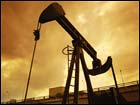
NEW YORK (CNN/Money) -
Crude oil prices jumped to their highest levels in six months Tuesday, driven by escalating violence in the Middle East and the threat of an embargo by Iraq.
As fighting continued around Palestinian leader Yasser Arafat's compound in the West Bank city of Ramallah, Iraq's acting Foreign Minister Human Abdul-Khaleq Abdul-Ghafur said Baghdad was ready to cut off oil supplies to the United States if Iran, a non-Arab Mideast producer, did the same.
"Use oil as a weapon in the battle with the enemy [Israel]," Iraq's ruling Baath party said in a statement published by Baghdad media Monday.
As a result, the price of a barrel of light crude oil for May delivery surged above $28 in New York for the first time in six months Tuesday before closing at $27.71, up 83 cents. Brent crude futures in London rose to $27.66 a barrel, also a six-month high.

"It looks like panic buying," a New York analyst told Reuters, adding that there was heavy buying from speculative hedge funds.
Gold also rose as investors sought safe havens for their money, pushing gold for June delivery up $2.80 to $307 in Chicago, the highest in nearly two years.
Oil prices have swelled from less than $20 a barrel since the end of 2001, when the Organization of the Petroleum Exporting Countries (OPEC) decided to cut production to boost prices. Meanwhile, the U.S. economy's recovery from its first recession in a decade has fueled demand, while concerns have grown about military action against Iraq.
Oil industry analysts invoked the memory of 1973 as a potential worst-case scenario being considered by the markets.
| |
 Related links
Related links
| |
| | |
| | |
|
"The concern in the oil market is one of the escalation in violence evolving into a pan-Arab conflict that might ultimately involve the movements of oil in a manner similar to the 1973 Arab oil embargo that targeted the U.S. for its support of Israel," Mike Rotham at Merrill Lynch said in a report.
The 1973 embargo led to a quadrupling of crude prices, badly damaging the U.S. and global economies. But Saudi Arabia and other major OPEC producers have said they have no intention of repeating the oil embargo, and some analysts said a global stockpile of some 4 million barrels would be enough to cover any shortfall caused by an embargo.
But higher oil prices add to costs for businesses and consumers and could fuel inflation, forcing the Federal Reserve to act more quickly to raise short-term interest rates, threatening the nascent recovery in the U.S. and global economies.
"Oil prices are volatile enough that you can't focus on one day's move," said Lara Rhame, economist with Brown Brothers Harriman. "But later in the year, a combination of robust global [economic] recovery and tension in the Middle East are really ingredients for a big spike in oil prices, and that can truly spell disaster for an economy."
Though Rhame and other analysts think the chances are slim that such a "perfect storm" of lingering violence in the Middle East and higher interest rates will come along and sink the global economy, "the scenario of a robust recovery is not problem-free," Rhame said.

-- Reuters contributed to this report
|

